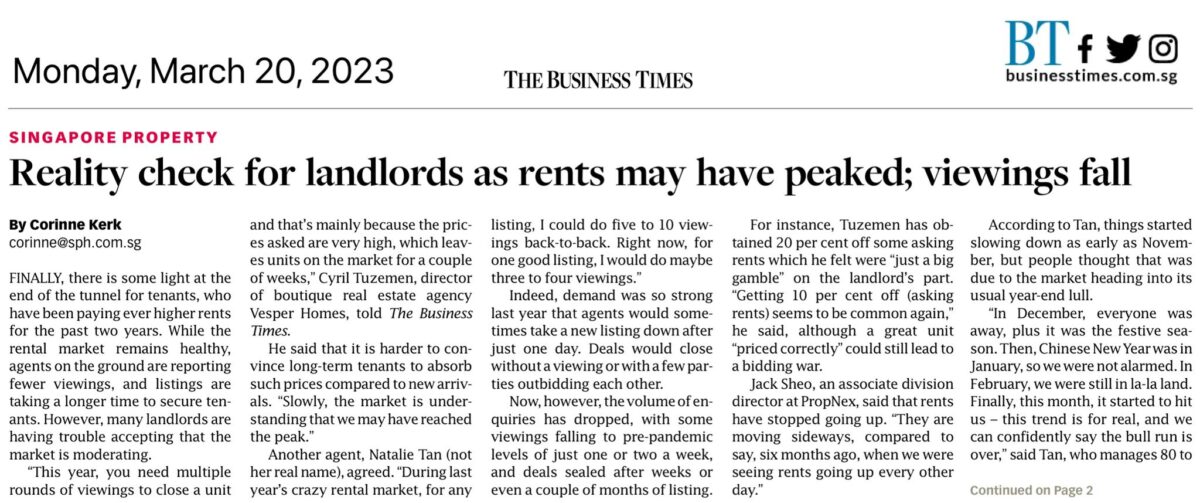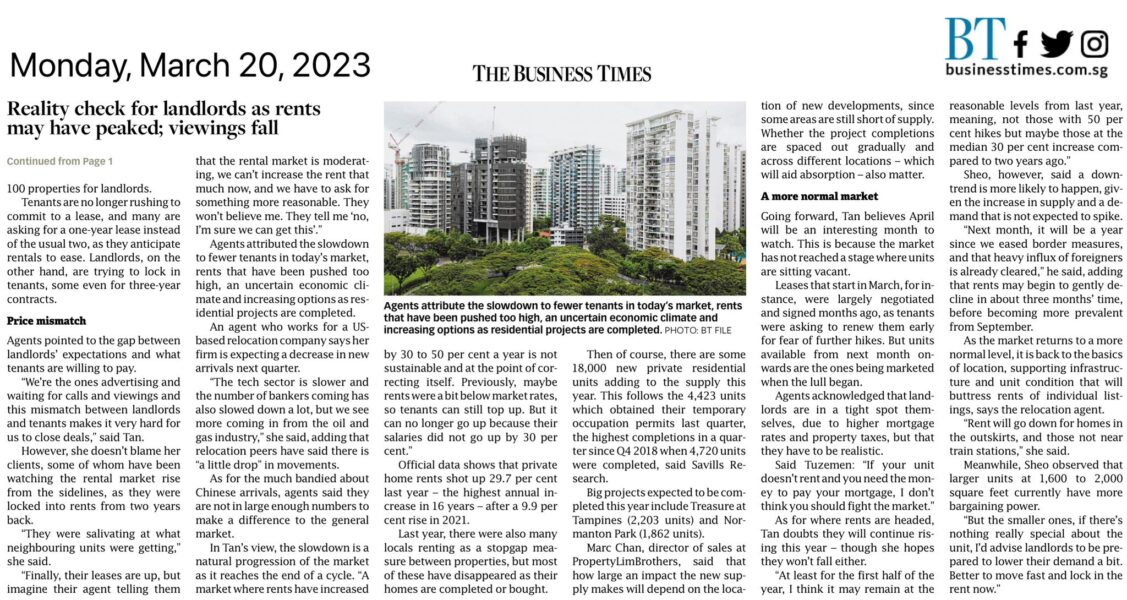Our director, Cyril Tuzemen, has recently shared his insights on the Singapore property market in a news article featured in The Business Times on 20 March 2023.
Cyril mentioned that due to the high asking prices, multiple rounds of viewings are necessary to close a unit. However, tenants can expect to negotiate a 10% reduction in asking rent, but a well-priced unit could still lead to a bidding war.
On the other hand, Cyril advises landlords not to fight the market if their units do not rent out and they need money to pay their mortgage.
At Vesper Homes, we provide valuable advice and keep you updated on the current market trends in Singapore’s property market, whether you’re a tenant or a homeowner.
Read the full article below:
FINALLY, there is some light at the end of the tunnel for tenants, who have been paying ever higher rents for the past two years. While the rental market remains healthy, agents on the ground are reporting fewer viewings, and listings are taking a longer time to secure tenants. However, many landlords are having trouble accepting that the market is moderating.
“This year, you need multiple rounds of viewings to close a unit and that’s mainly because the prices asked are very high, which leaves units on the market for a couple of weeks,” Cyril Tuzemen, director of boutique real estate agency Vesper Homes, told The Business Times.
He said that it is harder to convince long-term tenants to absorb such prices compared to new arrivals. “Slowly, the market is understanding that we may have reached the peak.”
Another agent, Natalie Tan (not her real name), agreed. “During last year’s crazy rental market, for any listing, I could do five to 10 viewings back-to-back. Right now, for one good listing, | would do maybe three to four viewings.”
Indeed, demand was so strong last year that agents would sometimes take a new listing down after just one day. Deals would close without viewing or with a few parties outbidding each other.
Now, however, the volume of enquiries has dropped, with some viewings falling to pre-pandemic levels of just one or two a week, and deals sealed after weeks or even a couple of months of listing.
For instance, Tuzemen has obtained 20 per cent off some asking rents which he felt were “just a big gamble” on the landlord’s part. “Getting 10 per cent off (asking rents) seems to be common again,” he said, although a great unit “priced correctly” could still lead to a bidding war.
Jack Sheo, an associate division director at PropNex, said that rents have stopped going up. “They are moving sideways, compared to say, six months ago, when we were seeing rents going up every other day.”
According to Tan, things started slowing down as early as November, but people thought that was due to the market heading into its usual year-end lull.
“In December, everyone was away, plus it was the festive season. Then, Chinese New Year was in January, so we were not alarmed. In February, we were still in la-la land. Finally, this month, it started to hit us — this trend is for real, and we can confidently say the bull run is over,” said Tan, who manages 80 to 100 properties for landlords.
Tenants are no longer rushing to commit to a lease, and many are asking for a one-year lease instead of the usual two, as they anticipate rentals to ease. Landlords, on the other hand, are trying to lock in tenants, some even for three-year contracts.

Price mismatch
Agents pointed to the gap between landlords’ expectations and what tenants are willing to pay.
“We’re the ones advertising and waiting for calls and viewings and this mismatch between landlords and tenants makes it very hard for us to close deals,” said Tan.
However, she doesn’t blame her clients, some of whom have been watching the rental market rise from the sidelines, as they were locked into rents from two years back.
“They were salivating at what neighbouring units were getting,” she said.
“Finally, their leases are up, but imagine their agent telling them that the rental market is moderating, we can’t increase the rent that much now, and we have to ask for something more reasonable. They won’t believe me. They tell me ‘no, I’m sure we can get this”.”
Agents attributed the slowdown to fewer tenants in today’s market, rents that have been pushed too high, an uncertain economic climate and increasing options as residential projects are completed.
An agent who works for a US-based relocation company says her firm is expecting a decrease in new arrivals next quarter.
“The tech sector is slower and the number of bankers coming has also slowed down a lot, but we see more coming in from the oil and gas industry,” she said, adding that relocation peers have said there is “a little drop” in movements.
As for the much bandied about Chinese arrivals, agents said they are not in large enough numbers to make a difference to the general market.
In Tan’s view, the slowdown is a natural progression of the market as it reaches the end of a cycle. “A market where rents have increased by 30 to 50 per cent a year is not sustainable and at the point of correcting itself. Previously, maybe rents were a bit below market rates, so tenants can still top up. But it can no longer go up because their salaries did not go up by 30 per cent.”
Official data shows that private home rents shot up 29.7 per cent last year the highest annual increase in 16 years after a 9.9 per cent rise in 2021.
Last year, there were also many locals renting as a stopgap measure between properties, but most of these have disappeared as their homes are completed or bought.
Then of course, there are some 18,000 new private residential units adding to the supply this year. This follows the 4,423 units which obtained their temporary occupation permits last quarter, the highest completions in a quarter since Q4 2018 when 4,720 units were completed, said Savills Research.
Big projects expected to be completed this year include Treasure at Tampines (2,203 units) and Normanton Park (1,862 units).
Marc Chan, director of sales at PropertyLimBrothers, said that how large an impact the new supply makes will depend on the location of new developments, since some areas are still short of supply. Whether the project completions are spaced out gradually and across different locations – which will aid absorption – also matter.

A more normal market
Going forward, Tan believes April will be an interesting month to watch. This is because the market has not reached a stage where units are sitting vacant.
Leases that start in March, for instance, were largely negotiated and signed months ago, as tenants were asking to renew them early for fear of further hikes. But units available from next month onwards are the ones being marketed when the lull began.
Agents acknowledged that landlords are in a tight spot themselves, due to higher mortgage rates and property taxes, but that they have to be realistic.
Said Tuzemen: “If your unit doesn’t rent and you need the money to pay your mortgage, I don’t think you should fight the market.”
As for where rents are headed, Tan doubts they will continue rising this year though she hopes they won’t fall either.
“At least for the first half of the year, I think it may remain at reasonable levels from last year, meaning, not those with 50 per cent hikes but maybe those at the median 30 per cent increase compared to two years ago.”
Sheo, however, said a downtrend is more likely to happen, given the increase in supply and a demand that is not expected to spike.
“Next month, it will be a year since we eased border measures, and that heavy influx of foreigners is already cleared,” he said, adding that rents may begin to gently decline in about three months’ time, before becoming more prevalent from September.
As the market returns to a more normal level, it is back to the basics of location, supporting infrastructure and unit condition that will buttress rents of individual listings, says the relocation agent.
“Rent will go down for homes in the outskirts, and those not near train stations,” she said.
Meanwhile, Sheo observed that larger units at 1,600 to 2,000 square feet currently have more bargaining power.
“But the smaller ones, if there’s nothing really special about the unit, I’d advise landlords to be prepared to lower their demand a bit. Better to move fast and lock in the rent now.




